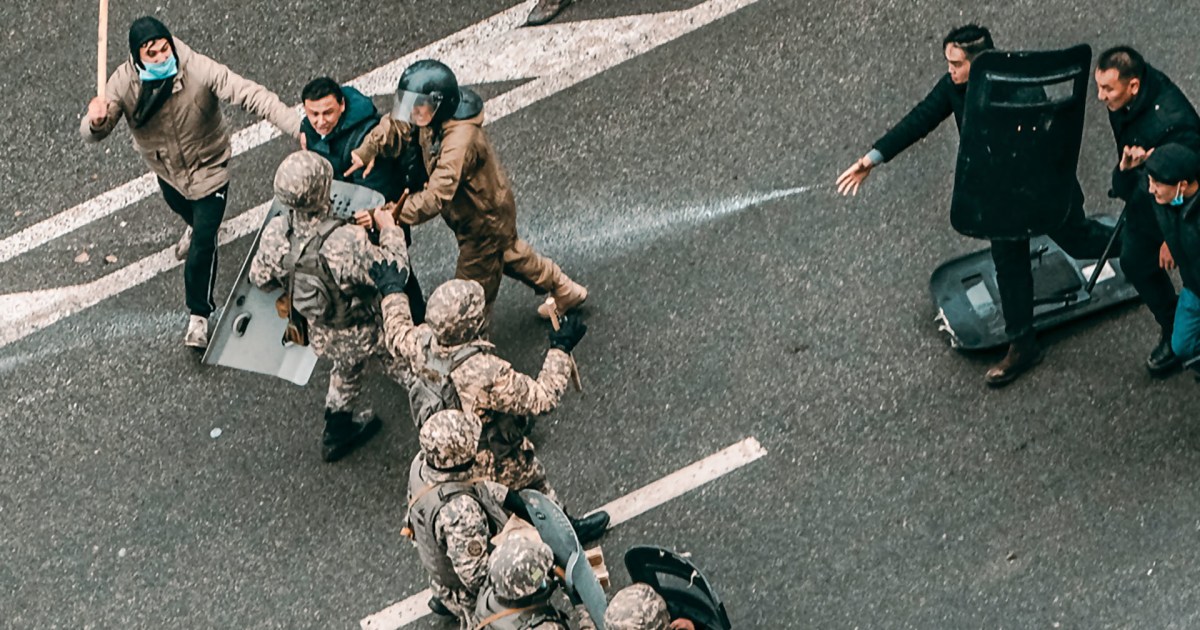The Kazakh Interior Ministry confirmed the arrest of about four thousand people during the continuous security operations throughout the country, while local media reported hearing gunfire in the vicinity of Republic Square in the center of Almaty, the largest city in the country.
The Ministry of the Interior also announced the killing of seven policemen in a security operation in Almaty, and the President of Kazakhstan Kassym-Jomart Tokayev said in a tweet on social media that those he described as "terrorists" carried out attacks on the city in six stages.
He stressed that the country faced "well-trained terrorist groups abroad."
reinforcements from Russia
On the ground, the Russian Ministry of Defense announced that the CSTO forces had taken full control of Almaty airport, and placed it under the control of the Kazakh security forces.
This announcement coincided with the arrival of more Russian reinforcements to Kazakhstan, where more than seventy aircraft transported military equipment and personnel of the Russian forces.
Commenting on the Russian military reinforcements, US Secretary of State Anthony Blinken warned Friday that Kazakhstan will find it difficult to limit Russian influence, after it asked Moscow to deploy forces on its soil to contain the unrest that has been going on since last Sunday.
"There is a lesson from recent history that once the Russians enter a country, getting them out is sometimes very difficult," Blinken said at a press conference in Washington.
Kazakhstan, the largest Central Asian country, is witnessing protests that broke out in the provinces on Sunday against the backdrop of raising gas prices before spreading to major cities, including the economic capital Almaty, where it turned into riots against the regime that left dozens dead.
And earlier on Friday, dozens of Russian planes dropped large numbers of soldiers to support the government in Kazakhstan over the protests.
Reuters quoted the Russian Defense Ministry that more than 70 aircraft landed Friday "peacekeeping forces" in Kazakhstan.
And the Russian Information Agency stated yesterday - quoting the Collective Security Treaty Organization (a military alliance of former Soviet republics) - that the force will include a total of about 2,500 personnel, and it will remain in Kazakhstan for days or weeks, and will leave as soon as its mission ends.
The organization added that the task of this force - which Tokayev requested last week - is not to suppress the protesters, but rather to help Kazakhstan protect vital installations, stressing that the events in this country are a real threat to the security and sovereignty of the state.
system recovery
Earlier Friday, Tokayev ordered the shooting of what he called "bandits and terrorists."
He added that constitutional order had been mostly restored.
In a speech broadcast on state television, the Kazakh president said that "about 20,000 bandits attacked the city of Almaty and destroyed state property," stressing that he had ordered law enforcement agencies and the army to "shoot to kill without warning," expressing his refusal to hold any talks. With the protesters, whom he described as criminals and murderers.
"The forces of establishing order are making unremitting efforts, and constitutional order has been largely restored in all regions," Tokayev said in a statement, stressing that operations to restore order will continue until the militants are completely eliminated.
He added, "The local authorities are controlling the situation, but the terrorists are still using weapons and damaging the property of citizens."
popular anger
The confrontations between the security forces and demonstrators took place after unprecedented protests erupted last Sunday, due to the increase in fuel prices at the beginning of this year, and then the protests escalated when, on Wednesday, protesters stormed public buildings - in areas including Almaty, the largest city in the country - and set them on fire.
On the other hand, the prominent Kazakh dissident residing in France, Mukhtar Ablyazov, said that the ruling regime in his country was "nearing its end in a popular revolution in which people united for the first time to express their anger."
Ablyazov - a former energy minister - added in an interview with Agence France-Presse that a Russian-led military intervention constituted an "occupation" and urged the Kazakhs to stand up to foreign forces.

